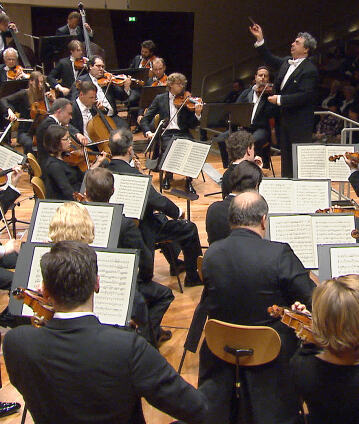Semyon Bychkov conducts Strauss and Schubert

In this concert from June 2014, the Berliner Philharmoniker and Semyon Bychkov commemorate the 150th anniversary of the birth of Richard Strauss. With Bruno Delepelaire and Máté Szűcs as the soloists, the programme included the composer’s Don Quixote, a work regarded as the epitome of symphonic tragi-comedy. Contrasting emotions were also in evidence in Franz Schubert’s “Great” Symphony, which constantly shifts in its expression of beauty and the abyss.
The Russian conductor Semyon Bychkov was a fan of the Berliner Philharmoniker when he was still a teenager, and even spent a night in police custody after unsuccessfully attempting to smuggle himself into a sold-out guest performance by the orchestra in St. Petersburg. Ever since he stood in at short notice for the indisposed Riccardo Muti in 1985 and – as the press noted – made a “conducting debut of considerable calibre,” he has been a regular guest of the Philharmoniker.
Philharmoniker audiences had heard Bychkov as an interpreter of the works of Richard Strauss on only one occasion, in 2008, when he conducted his Alpine Symphony. In this concert, another of the composer’s tone poems is on the programme, Don Quixote. Strauss’s work, inspired by Miguel de Cervantes’s chivalric novel of the same name, impresses with its subtle musical characterisation of the two main characters of Don Quixote and his servant Sancho Panza, and by its sound painting effects, such as the battle with the windmills and a stampeding herd of sheep. Strauss’s Don Quixote is represented by a solo cello, played here by Bruno Delepelaire, principal cellist with the Berliner Philharmoniker since 2013. Máté Szűcs, principal violist with the orchestra since 2011, gives voice to Sancho Panza.
Franz Schubert is another composer whose works Semyon Bychkov had conducted only once before in Philharmoniker concerts: his Second Symphony. In this concert he performs his “Great” C Major Symphony, which Robert Schumann described as the epitome of the Romantic symphony – because of its masterful composition, expressive melodies, finely tuned timbres and its “heavenly length.”
© 2014 Berlin Phil Media GmbH
Related interviews